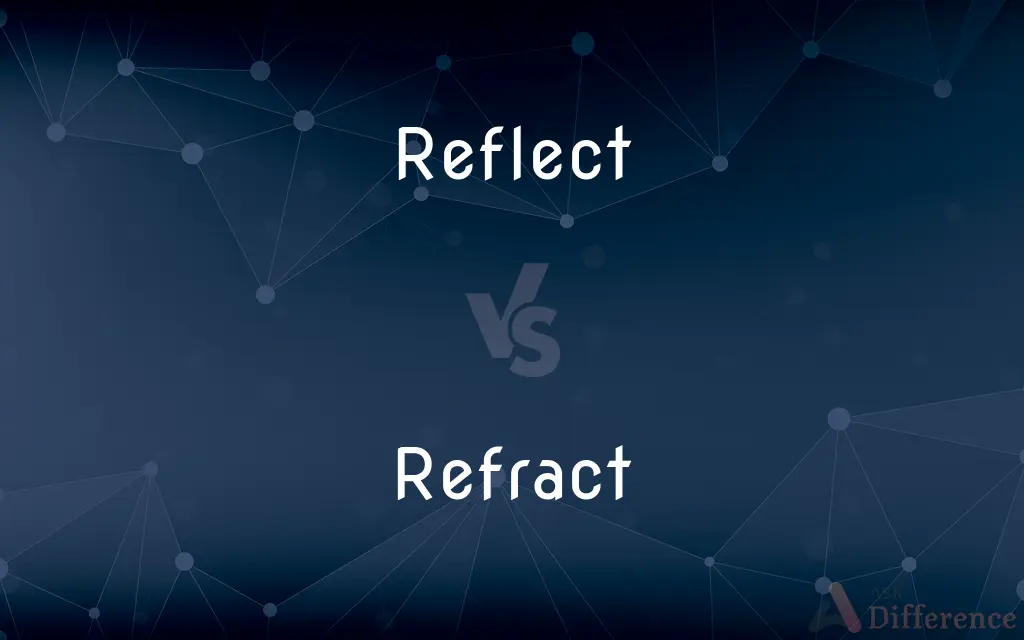Reflect vs. Refract — What's the Difference?
Edited by Tayyaba Rehman — By Urooj Arif — Updated on May 6, 2024
Reflect involves bouncing back light or sound from a surface, while refract is about light bending as it passes through different media.

Difference Between Reflect and Refract
Table of Contents
ADVERTISEMENT
Key Differences
Reflect refers to light, sound, or images bouncing back from surfaces without altering their medium or fundamental properties. Whereas refract deals with the change in direction of light as it passes from one medium to another, such as air to water, which causes the light waves to bend.
Reflect can occur on any reflective surface, such as mirrors or water, where the angle of incidence equals the angle of reflection. On the other hand, refract occurs specifically at the interface between two different media, altering the speed and direction of the light wave.
Reflect is primarily governed by the law of reflection, which states that the incident angle and reflected angle are always equal, relative to the normal to the surface. Whereas refract is governed by Snell's law, which relates the angles of incidence and refraction to the indices of refraction of the two media.
Reflect can result in phenomena like echoes and mirages, where the original waves are preserved while being redirected. Whereas refract can result in effects such as lensing, where light paths are bent, creating distortions or focus points.
Reflect is crucial in technologies like radar and sonar, where it helps detect objects by bouncing signals off them. Whereas refract is essential in the design of optical devices such as lenses, prisms, and spectacles, which rely on bending light to function.
ADVERTISEMENT
In photography, reflect is used to manipulate light and shadows for better image capture. Whereas refract is employed to create artistic effects through the distortion of light, such as in raindrop photography.
Comparison Chart
Definition
Bouncing of waves off a surface
Bending of waves as they enter a different medium
Governing Law
Law of Reflection
Snell's Law
Typical Phenomena
Echoes, Mirages
Lensing, Distortion of Images
Applications
Mirrors, Radar, Sonar
Lenses, Prisms, Spectacles
Visual Effect
Preserves the appearance and direction of waves
Changes the direction and speed of waves, alters paths
Compare with Definitions
Reflect
To reproduce; represent or show an image.
The documentary reflects the struggles of the era.
Refract
To cause to deviate from a straight line.
Water droplets refract the paths of light passing through them, creating a rainbow.
Reflect
To throw back light, heat, or sound without absorbing it.
The moon does not emit its own light, it reflects sunlight.
Refract
To alter the course of a wave of light or sound.
A prism refracts sunlight into a spectrum of colors.
Reflect
To show an image, as a mirror or water surface.
The still water reflected the serene scenery perfectly.
Refract
To measure the focusing characteristics of (an eye) or of the eyes.
Optometrists refract eyes to determine the appropriate lenses for correction.
Reflect
To cast as a result or consequence.
His work reflects his dedication.
Refract
To distort, as light passing through the atmosphere.
The straw looks bent in the water due to refraction.
Reflect
To bend or fold back.
The sound waves reflect off the canyon walls.
Refract
To determine the index of refraction.
Scientists refract light in different materials to study their properties.
Reflect
To throw or bend back (light or sound, for example) from a surface.
Refract
To deflect (light, for example) from a straight path by refraction.
Reflect
To give back or show an image of (an object); mirror.
Refract
To alter by viewing through a medium
"In the Quartet reality is refracted through a variety of eyes" (Elizabeth Kastor).
Reflect
To make apparent; express or manifest
Her work reflects intelligence.
Refract
(Medicine) To determine the refraction of (an eye, for example).
Reflect
To bring as a consequence
The victory reflects credit on the coach.
Refract
To change direction as a result of entering a different medium
Reflect
(Archaic) To bend back.
Refract
To cause (light) to change direction as a result of entering a different medium.
A prism can refract light.
Reflect
To be bent or thrown back
Her voice reflected off the canyon walls.
Refract
To bend sharply and abruptly back; to break off.
Reflect
To give something back, as light or sound
A shiny surface that reflects well.
Refract
To break the natural course of, as rays of light orr heat, when passing from one transparent medium to another of different density; to cause to deviate from a direct course by an action distinct from reflection; as, a dense medium refrcts the rays of light as they pass into it from a rare medium.
Reflect
To give evidence of the characteristics or qualities of someone or something
That student's performance reflects well on the whole school.
Refract
Subject to refraction;
Refract a light beam
Reflect
To bring blame or discredit
Hasty preparation of the report will reflect on you.
Refract
Determine the refracting power of (a lens)
Reflect
To think seriously.
Reflect
To express carefully considered thoughts
In the essay, he reflects on his career.
Reflect
(transitive) To bend back (light, etc.) from a surface.
A mirror reflects the light that shines on it.
Reflect
(intransitive) To be bent back (light, etc.) from a surface.
The moonlight reflected from the surface of water.
Reflect
(transitive) To mirror, or show the image of something.
The shop window reflected his image as he walked past.
Reflect
(intransitive) To be mirrored.
His image reflected from the shop window as he walked past.
Reflect
(transitive) To agree with; to closely follow.
Entries in English dictionaries aim to reflect common usage.
Reflect
(transitive) To give evidence of someone's or something's character etc.
The team's victory reflects the Captain's abilities.
The teacher's ability reflects well on the school.
Reflect
(intransitive) To think seriously; to ponder or consider.
People do that sort of thing every day, without ever stopping to reflect on the consequences.
Reflect
To bend back; to give a backwa d turn to; to throw back; especially, to cause to return after striking upon any surface; as, a mirror reflects rays of light; polished metals reflect heat.
Let me mind the reader to reflect his eye on our quotations.
Bodies close together reflect their own color.
Reflect
To give back an image or likeness of; to mirror.
Nature is the glass reflecting God,As by the sea reflected is the sun.
Reflect
To throw back light, heat, or the like; to return rays or beams.
Reflect
To be sent back; to rebound as from a surface; to revert; to return.
Whose virtues will, I hope,Reflect on Rome, as Titan's rays on earth.
Reflect
To throw or turn back the thoughts upon anything; to contemplate. Specifically: To attend earnestly to what passes within the mind; to attend to the facts or phenomena of consciousness; to use attention or earnest thought; to meditate; especially, to think in relation to moral truth or rules.
We can not be said to reflect upon any external object, except so far as that object has been previously perceived, and its image become part and parcel of our intellectual furniture.
All men are concious of the operations of their own minds, at all times, while they are awake, but there few who reflect upon them, or make them objects of thought.
As I much reflected, much I mourned.
Reflect
To cast reproach; to cause censure or dishonor.
Errors of wives reflect on husbands still.
Neither do I reflect in the least upon the memory of his late majesty.
Reflect
Manifest or bring back;
This action reflects his true beliefs
Reflect
To throw or bend back or reflect (from a surface);
A mirror in the sun can reflect light into a person's eyes
Sound is reflected well in this auditorium
Reflect
Reflect deeply on a subject;
I mulled over the events of the afternoon
Philosophers have speculated on the question of God for thousands of years
The scientist must stop to observe and start to excogitate
Reflect
Be bright by reflecting or casting light;
Drive carefully--the wet road reflects
Reflect
Give evidence of a certain behavior;
His lack of interest in the project reflects badly on him
Reflect
Give evidence of the quality of;
The mess in his dorm room reflects on the student
Common Curiosities
Can reflection and refraction occur simultaneously?
Yes, both phenomena can occur simultaneously, such as when light hits a glass window, some of it is reflected, and some is refracted.
Why does the sky appear blue?
The sky appears blue due to Rayleigh scattering, where blue light is scattered in all directions by the atmosphere more than other colors.
What is refraction?
Refraction is the bending of a wave, such as light or sound, when it enters a medium where its speed is different.
What are the practical applications of refraction?
Applications include lenses in eyeglasses, cameras, microscopes, and the creation of optical illusions.
How do polarized sunglasses utilize reflection?
Polarized sunglasses utilize reflection by blocking horizontally reflected light, which reduces glare.
How does refraction aid in vision correction?
Refraction is used in lenses to correct vision by adjusting how light focuses on the retina.
What is reflection?
Reflection is the process where light, sound, or other waves are returned at an interface between two different media, without being absorbed or transmitted.
What are the practical applications of reflection?
Practical applications include mirrors, echolocation in bats and dolphins, and radar used in aviation and meteorology.
How does refraction affect our perception of objects in water?
Refraction makes objects submerged in water appear closer to the surface and shifted from their original position.
What causes mirages?
Mirages are caused by the reflection of light through layers of varying temperature air, creating a displaced image of distant objects.
What role does refraction play in rainbows?
Rainbows are formed by refraction and internal reflection of sunlight inside water droplets in the atmosphere.
Why do stars twinkle?
Stars twinkle due to refraction of their light by Earth’s atmosphere, which causes the light path to change slightly.
What determines the angle of refraction?
The angle of refraction is determined by the indices of refraction of the media involved and the angle at which the light enters the new medium.
What is the index of refraction?
The index of refraction is a measure of how much a substance can bend light.
How do fiber optic cables use reflection?
Fiber optic cables use total internal reflection to transmit light with minimal loss over long distances.
Share Your Discovery

Previous Comparison
Accustom vs. Custom
Next Comparison
Skill vs. HabitAuthor Spotlight
Written by
Urooj ArifUrooj is a skilled content writer at Ask Difference, known for her exceptional ability to simplify complex topics into engaging and informative content. With a passion for research and a flair for clear, concise writing, she consistently delivers articles that resonate with our diverse audience.
Edited by
Tayyaba RehmanTayyaba Rehman is a distinguished writer, currently serving as a primary contributor to askdifference.com. As a researcher in semantics and etymology, Tayyaba's passion for the complexity of languages and their distinctions has found a perfect home on the platform. Tayyaba delves into the intricacies of language, distinguishing between commonly confused words and phrases, thereby providing clarity for readers worldwide.












































